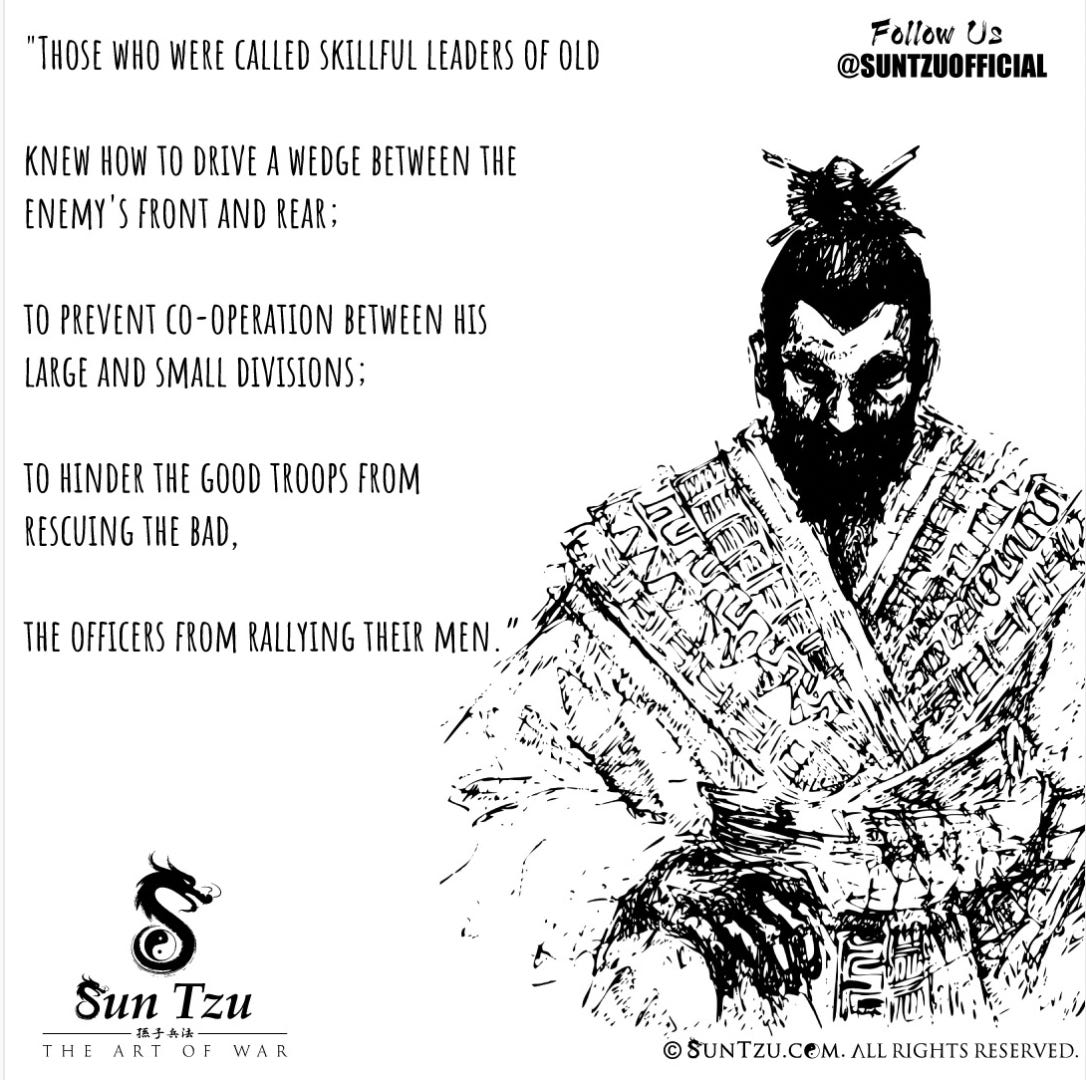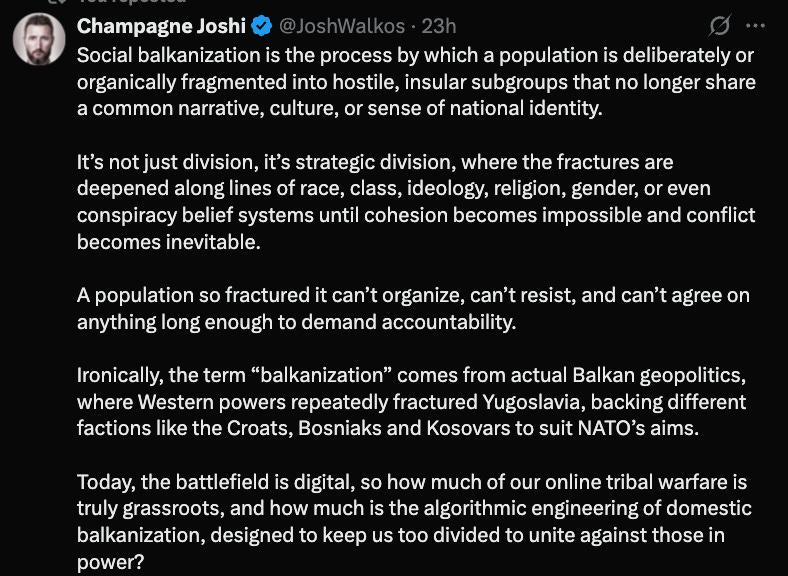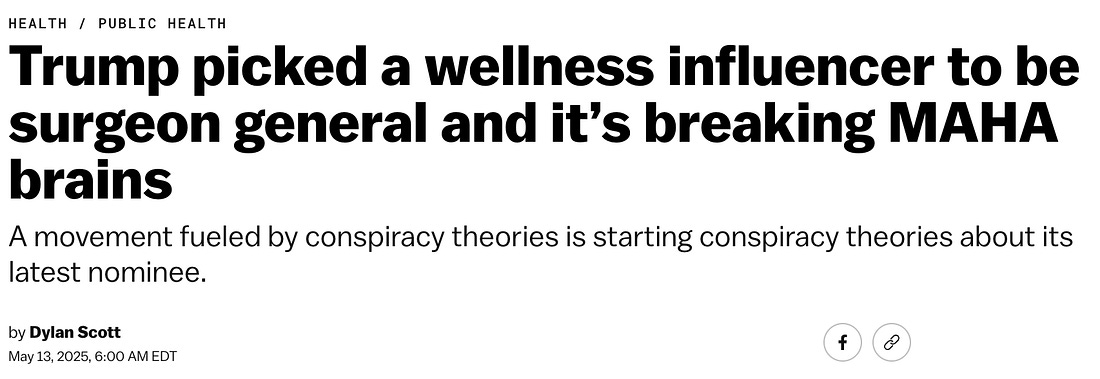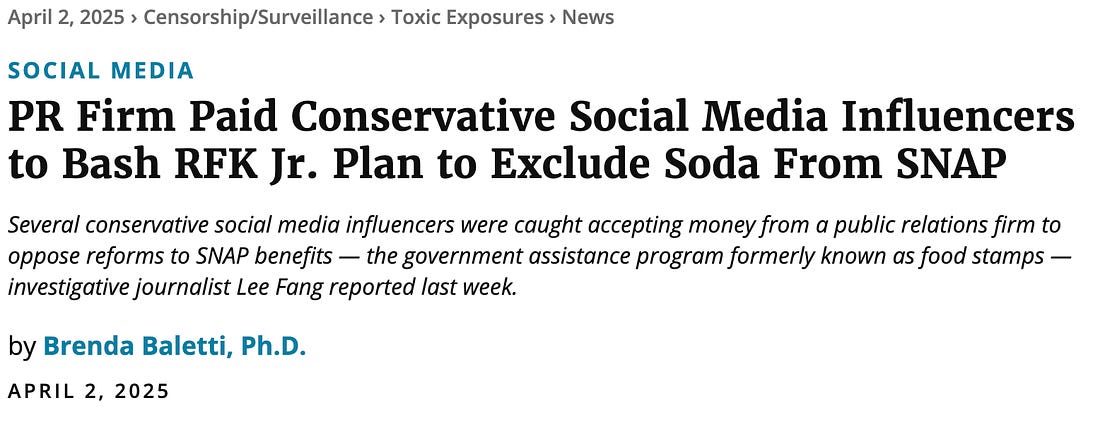Cyber Balkanization- Welcome to the Splinternet
Divide and conquer meets fifth-generation #PsyWar
| ROBERT W MALONE MD, MS MAY 13 |

Knowing their thoughts, Jesus said to them,
“Every kingdom divided against itself is laid waste; and no city or house divided against itself will stand.”
Matthew 12:25
=============================================
The dark triad : Machiavellianism, narcissism, and psychopathy.
========================================
Somehow, my mission in life has evolved from teaching people about mRNA drug delivery technology, bioethics, clinical research, and regulatory affairs to educating others about the many ways that corporate and social media are psychologically manipulating them. Many of those ways involve ancient strategies and tactics described in Sun Tzu’s “The Art of War” and Machiavelli’s “The Prince”. Today, I will focus on tactics and strategies routinely deployed to “divide and conquer.” Matthew said it best, but let’s take a moment to explore how this relates to today’s social and corporate media ecosystem.
This discussion was prompted by a recent posting on “X” by Josh Walkos.

Ancient Wisdom: “The Art of War” versus “The Prince”
One big difference between “The Art of War” and “The Prince” has to do with ethics. Sun Tzu had deeply held beliefs regarding ethics and honor.
Machiavelli’s writing and advice were essentially devoid of ethical considerations, which is why he is often considered evil, to such an extent that modern psychology considers Machiavellian behaviors (Machiavellianism) a key component of the “dark triad” of behaviors.
The dark triad is a psychological theory of personality, first published in 2002, that describes three notably offensive personality types: Machiavellianism, narcissism, and psychopathy.
Each of these personality types is referred to as dark because each are considered to contain malevolent qualities.
All three dark triad traits are conceptually distinct, although empirical evidence shows them to be overlapping. They are associated with a callous–manipulative interpersonal style.
- Narcissism is characterized by grandiosity, pride, egotism, and a lack of empathy.
- Machiavellianism is characterized by manipulativeness, indifference to morality, lack of empathy, and a calculated focus on self-interest.
- Psychopathy is characterized by continuous antisocial behavior, impulsivity, selfishness, callous and unemotional traits, and remorselessness.
Moving on to Sun Tzu’s „The Art of War,” the concept of divide and conquer is explored in various chapters, emphasizing the importance of dividing forces to manage them effectively. According to Sun Tzu, managing a large force can be made like managing a small force by dividing the numbers, allowing for better control and coordination.
Sun Tzu advises that when facing an enemy, if your forces are ten times greater, surround them; if five times greater, attack them; and if double the strength, divide them. This strategy aims to weaken the enemy by causing internal divisions and confusion, making them easier to defeat.
In the context of military tactics, Sun Tzu also highlights the importance of not besieging walled cities if possible, as it is the worst policy. Instead, he advocates for breaking the enemy’s resistance without fighting, which can be achieved through strategic planning and manipulation of the enemy’s forces.
Additionally, Sun Tzu emphasizes the importance of unity within one’s own army and the use of spies to gather information about the enemy, which can be crucial in implementing divide and conquer strategies effectively.
However, Sun Tzu teaches that the divide-and-conquer strategy must never be used for personal gain, amusement, or profit. It must only be employed to combat an evil foe. Doing so otherwise would only make you nothing more than a sociopath, a narcissist, a fiend. Not a Warrior of Virtue.
Sun Tzu states that the commander stands for the virtues of wisdom, sincerity, benevolence, courage, and strictness.
- Wisdom: Refers to the ability to make sound judgments and decisions.
- Sincerity: Indicates honesty and genuineness in dealings.
- Benevolence: Implies kindness and compassion towards others.
- Courage: Represents bravery and fearlessness in the face of danger.
- Strictness: Denotes the need for discipline and adherence to rules.
These virtues are essential for a commander to lead effectively and ensure the success of their military endeavors.
Social Balkanization in the Internet Age
The Splinternet (Wikipedia)
The splinternet (also referred to as cyber-balkanization or internet balkanization) is a characterization of the Internet as splintering and dividing due to various factors, such as technology, commerce, politics, nationalism, religion, and divergent national interests. „Powerful forces are threatening to balkanise it”, wrote the Economist weekly in 2010, arguing it could soon splinter along geographic and commercial boundaries.[1] The Chinese government erected the „Great Firewall” for political reasons, and Russia has enacted the Sovereign Internet Law that allows it to partition itself from the rest of the Internet.[2][3] Other nations, such as the US and Australia, have discussed plans to create a similar firewall to block child pornography or weapon-making instructions.[1]
Clyde Wayne Crews, a researcher at the Cato Institute, first used the term in 2001 to describe his concept of „parallel Internets that would be run as distinct, private, and autonomous universes.”[4] Crews used the term in a positive sense, but more recent writers, like Scott Malcomson, a fellow in New America’s International Security program, use the term pejoratively to describe a growing threat to the internet’s status as a globe-spanning network of networks.[5]
- „A virtual counter-revolution” The Economist, 2010-09-02
- ^ Schulze, Elizabeth (2019-11-01). „Russia just brought in a law to try to disconnect its internet from the rest of the world”. CNBC. Retrieved 2021-02-28.
- ^ „Russia: Growing Internet Isolation, Control, Censorship”. Human Rights Watch. 2020-06-18. Retrieved 2021-02-28.
- ^ Libertarian, or Just Bizarro?, Aparna Kumar, WIRED
- ^ Malcomson, Scott (Jan 29, 2016). „WATCH: Scott Malcomson — Charlie Rose” (video). charlierose.com. Charlie_Rose_(talk_show).
Splintering of the Internet community can occur when people engage in confirmation bias and create echo chambers, using the Internet to exclude or avoid views that contradict their beliefs and attitudes.[24] Called Cyberbalkanization (or sometimes cyber-balkanization), it refers to the division of the Internet or the World Wide Web into sub-groups with specific interests (digital tribes), where the sub-group’s members almost always use the Internet or the web to communicate or read material that is only of interest to the rest of the sub-group. The term may have first been used in an MIT paper by Marshall Van Alstyne and Erik Brynjolfsson that was published online in March 1997.[25] The concept was also discussed in a related November 1996 article in the journal Science[26] and in a Spring 1997 law review article.[27] The term is a hybrid of cyber, relating to the Internet, and Balkanization, a phenomenon that takes its name from the Balkans, a part of Europe that was historically subdivided by languages, religions and cultures.
In his 2001 book Republic.com, Cass Sunstein argued that cyberbalkanization could damage democracy, because it allows different groups to avoid exposure to one another as they gather in increasingly segregated communities, making recognition of other points of view or common ground decreasingly likely. The commentator Aleks Krotoski feels that Jihadist groups often use the Internet in this way.[28]
Despite the concerns of cyberbalkanization, there is mixed evidence that it is actually growing. One Wharton study found that internet filters can create commonality, not fragmentation. However, this study primarily focused on music recommendation algorithms, and openly states that more research is required surrounding other domains (e.g. news, books, fashion).[29] Another study found that ideological segregation of online newsconsumption is low in absolute terms, higher than the segregation of most offline news consumption, and significantly lower than the segregation of face-to-face interactions with neighbors, co-workers, or family members. The study notes that an important caveat, however, is that none of their evidence speaks to the way people translate the content they encounter into beliefs, which may be a larger factor in the problem these types of studies seek to address.[30]
- Humprecht, Edda; Esser, Frank; Aelst, Peter Van (2020-01-24). „Resilience to Online Disinformation: A Framework for Cross-National Comparative Research”. The International Journal of Press/Politics. 25 (3): 493–516. doi:10.1177/1940161219900126. hdl:10067/1661680151162165141.
- ^ Electronic Communities: Global Village or Cyberbalkans?, March 1997 paper
- ^ Van Alstyne, Marshall (1996). „Could the Internet Balkanize Science?”. Science. 274 (5292): 1479–1480. Bibcode:1996Sci…274.1479V. doi:10.1126/science.274.5292.1479. S2CID 62546078.
- ^ Chin, Andrew (Spring 1997). „Making the World Wide Web Safe for Democracy: A Medium-Specific First Amendment Analysis”. Hastings Comm/Ent Law Journal. 19 (2): 309–338.
- ^ „BBC Two – The Virtual Revolution, Enemy of the State?”. BBC.
- ^ Hosanagar, Kartik; Fleder, Daniel; Lee, Dokyun; Buja, Andreas (December 2013). „Will the Global Village Fracture into Tribes: Recommender Systems and their Effects on Consumers”. Management Science, Forthcoming. SSRN 1321962.
- ^ Gentzkow, Matthew; Shapiro, Jesse M. (2010-04-13). „Ideological Segregation Online and Offline”. Rochester, NY: Social Science Research Network. SSRN 1588920
Cyber Balkanization and PsyWar
From Vox News:

Fifth Generation Warfare Principles
Fifth Generation Warfare (5GW) is characterized by its focus on non-kinetic military actions such as social engineering, misinformation, and cyberattacks, often leveraging emerging technologies like artificial intelligence and autonomous systems. It is described as a war of „information and perception,” aiming to manipulate cognitive biases and create new ones to achieve strategic objectives. This form of warfare seeks to dominate the human domain without resorting to overt violence or kinetic military actions, making it difficult to attribute attacks to specific actors.
Key principles of 5GW include:
- Secrecy: Operations are often covert, making it hard to identify the perpetrators.
- Manipulation of Proxies: Using intermediaries to carry out actions on behalf of the actual instigators.
- Manipulation of Identity and Culture: Leveraging disinformation and big data to shape societal attitudes and behaviors.
- Psychological Warfare: Employing tactics to influence the mental and emotional states of adversaries and civilians.
These principles are applied through various technologies and techniques, such as social media manipulation, cyber operations, and the use of emerging technologies to influence human behavior and societal structures. In 5GW, the battlefield is your mind, and the objective is control of the battlefield. There are no rules of engagement – anything goes. 5GW seeks to control all information you access via any source, and thereby to control your ideas, thoughts, emotions, motivations, and actions- all of the things that are associated with who you are. In 5GW, there is no distinction between combatants and non-combatants.
In a successful Fifth Generation Warfare campaign, those targeted should never be aware that they are the targets, and they should never be aware of who is doing the targeting. In the resulting surrealistic media landscape, it becomes extremely difficult to tell the difference between friend and foe, and to discriminate between truth and lies.

Virtually all modern governments, all large corporations, and most large non-governmental organizations have adopted PsyWar technologies and approaches to advance both political and marketing objectives. Propaganda, marketing, and modern PsyWar methods have merged to yield a seamless continuum.
Psychological Warfare relies upon the theory and art of war, but extends this theory into the information sphere. This includes the use of historically effective tactics and strategies such as “divide and conquer”. In the case of social media, the new toolkit for dividing and conquering communities and populations provides a wealth of opportunities. The use of bots, trollery, and all of the many ways that these can be used to manipulate audiences are routinely deployed. This includes the use of chaos agents and bot farms to sow and promote discord, anger, and division within dissident communities. The practice of paying “influencers” to promote narratives has become routine.
For one example, see this recent article by the Children’s Health Defense publication “The Defender”:

Reporter Nick Sortor was the first to reveal that the public relations firm Influenceable was behind the posts. It had reportedly paid influencers up to $1,000 per post to oppose the SNAP reforms.
Several conservative social media influencers were caught accepting money from a public relations firm to oppose reforms to SNAP benefits — the government assistance program formerly known as food stamps — investigative journalist Lee Fang reported last week.
The campaign emerged in response to Secretary of Health and Human Services (HHS) Robert F. Kennedy Jr.’s proposal that soda and processed foods be excluded from the over $100 billion government program that helps 42 million low-income people supplement their grocery budget.
Brooke Rollins, secretary of the U.S. Department of Agriculture (USDA), has also signaled support for the proposed reforms. The program is administered by the USDA, not HHS.
A significant portion of SNAP benefits are spent on “ultra-sugary drinks” that offer minimal nutrition, according to Fang.
“We shouldn’t be subsidizing people to eat poison,” Kennedy told Fox News host Laura Ingraham.
In another interview with podcaster Michael Knowles, Kennedy said, “If you want a Coca-Cola, you ought to be able to get one and we have no objection to that.” But taxpayer money intended to feed low-income children shouldn’t be used for sugary soda “which is giving them diabetes.”
Kennedy said taxpayers foot the bill twice, when Medicare funds then go to cover healthcare for people with chronic diseases.
The proposed reforms have gained popular support, particularly from conservatives, who tend to favor cuts to welfare programs, according to Substack writer Will Sommer.
But shortly after Kennedy publicly made his case, several high-profile conservative accounts began criticizing the reforms, denouncing Kennedy’s “war on soda.”
According to Sommer:
“A wave of MAGA types started to take the pro-soda position. In similarly worded posts, Cheong, Prather, Daugherty, popular MAGA meme account ‘Clown World,’ and other X users with big followings said it was unfair for the government to tell recipients how to spend their food-stamp money.
“‘Is Mountain Dew nutritious and life-giving?’ posted Kevin Posobiec, a pro-Trump figure best known for being the brother of pundit Jack Posobiec, in a since-deleted post on X. ‘No. But freedom of choice is.’
“A number of the posts focused on the fact that Donald Trump himself drinks Diet Coke — the implicit suggestion being that it would be horribly wrong to tell the president that he can’t drink his soda.
“‘President Trump literally has a Diet Coke button in his Oval Office,’ wrote Daugherty.”
Many of the posts had near-identical messages, Fang wrote. Blake Marnell, a pro-Trump anchor whose X handle is Brick Suit, first pointed out the similarities on X. Then Turning Point USA’s Riley Gaines posted that she was offered money to make similar posts, but declined.
Sorter found messages that included templates provided by Influenceable to influencers in what he said was an attempt “to turn MAGA folks against RFK Jr. and MAHA” — Make America Healthy Again.
After Sorter outed the influencers on X, Daugherty confirmed the allegations, posting on X, “Yeah, that was dumb of me. Massive egg on my face. In all seriousness, it won’t happen again.”
Sorter also said this was a playbook, often used by soda industry lobbying firms like American Beverage and Cart Choice. This led some people to mistakenly report that American Beverage was behind the scheme, which the firm denies.
American Beverage was caught in 2023 paying off dieticians to promote sugar and aspartame to kids on Instagram.
Fang similarly noted this tactic revealed a “longstanding pattern in the beverage industry’s approach to policy debates over sugary drinks.” For example, the industry has funded scientists to persuade people to focus on exercise instead of calorie intake for weight loss strategies.
When San Francisco proposed taxes on sweetened beverages, Big Soda paid protestors to attend anti-tax rallies and argue the tax would disproportionately harm minority communities, Fang wrote.
The industry used similar tactics in New York, where Coca-Cola funded the NAACP and the Hispanic Federation, which then promoted similar arguments when the city proposed a soda tax.
Fang also reported that the industry targets organizations focused on children’s health. For example, Coca-Cola has given nearly $3 million to the American Academy of Pediatrics over six years, and the organization stayed silent during contentious policy debates over sugary drinks.
Save the Children, which supported a soda tax in the past, changed its position when it sought grants from soda producers, including $5 million from PepsiCo.
Health reporter Nina Teicholz commented on the influencer grift on her Substack. She said she wasn’t surprised. “But I do wonder why conservative influencers, some with more than 1M followers each, would sell their credibility for so little cash. Only $1,000 to sell your soul?”
Concluding Remarks
Please do not be naive. Big food, Big Pharma, Big Ag, the Democrat party, and a multitude of leftist organizations and NGOs are actively deploying Fifth Generation Warfare tactics to divide and conquer the Make America Healthy Again movement, and specifically to delegitimize and neutralize both Secretary Kennedy and President Trump’s HHS appointees. Let’s resolve to all try not to help them achieve their objectives?
I beg you. When online, please be sure to act like a mature adult. No matter how pissed off you may be at someone. Don’t let your passion or anger get the better of you. When you interact on social media, this is often done to influence others. Avoid witch hunts, no matter how important the cause. Remember that you are acting as both a role model and an ambassador for your cause. Be like Sun Tzu’s Commander and not like Machiavelli’s Prince. Choose your words wisely. Others are watching and are judging your cause by your actions and words.
Washington DC is functionally the Imperial Capital of the world, and DC politics are the big league. If you are going to gird your loins and enter the big league PsyWar battlefield, remember that you may think you are a player, but more likely than not you are going to get played. So get smart, and maintain professionalism, balance, humility and decorum. You are an idea ambassador, so act the part.
And if you can’t run with the Big Dogs, then stay on the porch.

